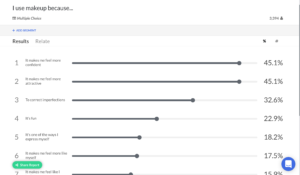We were curious to find out why women use cosmetics. So we asked over 3000 representative American women to share their reasons with us. These are the answers we received:

Let's take a look at the top two responses.
You’re probably not surprised to see that 45% of women use makeup to feel more attractive. After all, we all want to be beautiful – and brands know that. That’s why so many messages in the makeup industry are all about the looks their products will help achieve, as these recent examples demonstrate:

However, there is more to makeup than meets the eye; Notice the very top response:

45% of respondents use makeup to feel more confident
We found that women use beauty products to shape a more positive self-image. This data is also backed by scientific research: A recent study showed that women who wore makeup performed better on academic tests due to the boost in their self-esteem.
When we asked respondents to elaborate further, some even mentioned they use beauty products because “It helps me feel better on days I’m self-conscious”, and “Just makes me feel pretty! I suffer from depression and anxiety and makeup makes me feel better about myself.”
Clearly, many consumers value the confidence-boost associated with wearing makeup.
To identify consumers who are more likely to use makeup for this reason, we created several segments based on demographic and behavioral characteristics. Things get really interesting when we segment respondents based on household income, age and monthly spend on beauty:

It seems mid-upper income Millenials who spent over $21 on makeup every month, are almost twice as likely to use makeup for a confidence boost compared to lower income, mature consumers, who spent less money on makeup.
This means that brands who wish to win the hearts and dollars of Millennials who use makeup on a daily basis should start embracing their desire to feel strong and confident.
After analyzing dozens of ads and marketing campaigns released in the past couple of years, we concluded that the majority of beauty brands don't tend to address this desire. We did find a handful of empowering messages such as Revlon's "LIVE BOLDLY" campaign and Maybelline's "LASH LIKE A BOSS" mascara ad. Though these catchy taglines are definitely aligned with consumers' inner worlds, they don't directly touch on the emotional needs makeup fulfills.
Two of the rare brands that do focus on women’s self-esteem are Bobbi Brown and CoverGirl.
You’ll find messages of confidence in many of Bobbi Brown communications. Its newly released product, "INSTANT CONFIDENCE STICK" accompanied with copy such as "Confidence is everything, but a little skincare can't hurt" shows how well they understand their customers.
CoverGirl's recent re-brand takes it even further: Self-confidence and empowerment have become part of its identity. Their "I Am What I Makeup" slogan and recent marketing campaigns emphasize the power of makeup.
Curiously, CoverGirl also happens to be the most popular brand, across all age groups:

48% of respondents have used CoverGirl products in the past month
Of course, it is hard to pinpoint the exact reasons for CoverGirl success and growing popularity, but the results of our survey suggest they are onto something. Feel free to play with the data and dig deeper. You just might find something of value for your next major business decision.

